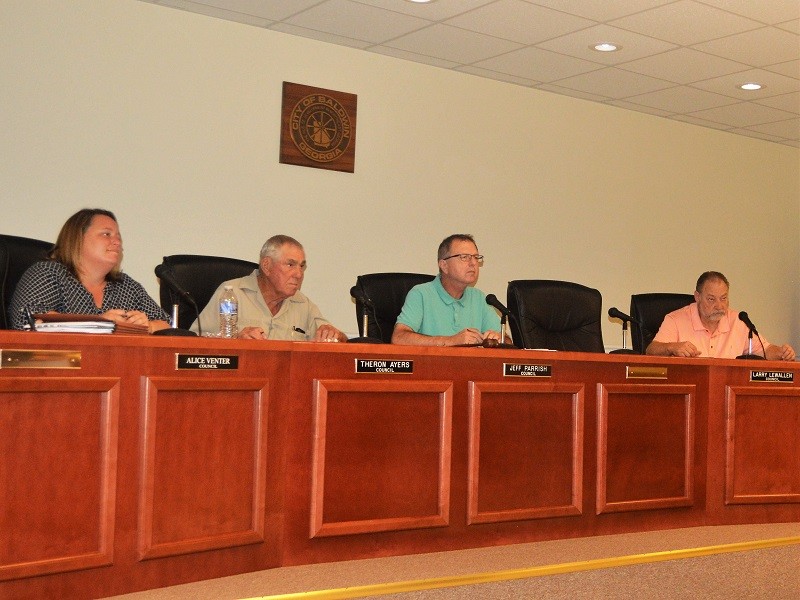BALDWIN — The Baldwin City Council learned Monday night the city faces new federal guidelines restricting wastewater plant discharge into the Chattahoochee River Basin affecting Lake Lanier.
The change, that cuts in half the amount of phosphorous allowed in discharge, is something the city’s current water plant is not capable of achieving — and will be very costly.
The stricter U.S. Environmental Protection Agency requirements are being enforced by the Georgia Environmental Protection Division through its permitting process.
Getting Baldwin’s wastewater plant modified to handle what engineer Fletcher Holliday calls “extremely stringent” new discharge requirements could be very costly for the City of Baldwin.
“As it pertains to the City of Baldwin, EPD under the mandate of EPA, has reduced the phosphorous limit for the City of Baldwin discharge,” Holliday told AccessWDUN. “In the past, they had a one part per million of total phosphorous that they were able to discharge, and with this new permit that is going in place that is reduced to 0.5 parts per million of total phosphorous.”
Holliday is vice president of Engineering Management Inc. (EMI), the engineering firm used by the city for such projects.
Under the previous permit the city only had to meet the one part per million discharge requirement set forth by the EPA.
“Essentially 99 percent of the time the city was able to achieve permit compliance with the one part per million of total phosphorous,” Holliday said. “But with reduction of 0.5, under the current design of the wastewater treatment facility it would be extremely difficult to meet that permit requirement of 0.5.”
Holliday told the city council the EPA through EPD went from a “very stringent” to an “extremely stringent” discharge requirement, and to meet the new threshold will cost the city more that what the city’s typical budget will accommodate.
“At this point in time just based off of our knowledge and history of the plant and generally what’s typically required of this type of loading, we would be looking at putting in two large, conventional, circular clarifiers, which would be in excess of $1 million, based on our current estimate,” Holliday said.
Mayor Pro Tem Jeff Parrish asked City Manager Jerry Neace to notify Georgia Department of Corrections officials the price for sewer service to Lee Arrendale State Prison in Alto likely will rise as a result of the new federal and regulations being implemented by EPD on the city for wastewater treatment.
Before an agreement was reached during the lengthy previous negotiations with Baldwin, state officials looked at the possibility of constructing some sort of wastewater treatment facility to serve Lee Arrendale State Prison in Alto.
Since notification of state officials was pending as of Monday night’s meeting, Parrish worries that issue could arise again.
Parrish said he’d rather have Corrections officials notify the city now that they are making alternate plans for the prison’s wastewater treatment than for the city to proceed with modifications to the city’s plant and then find out the state has made other arrangements for the prison’s wastewater treatment because of the increased costs being passed along.
But Neace said he expects even the increased costs passed along by the city to be more cost-effective for the state than constructing a treatment plant on the prison property.
“With that stringent of a requirement for a wastewater treatment facility to go in, it would be very difficult for them to put one there without a substantial cost being put in place on them,” Neace told the council. “What would have cost them $3.5 million to $4 million dollars four years ago would now cost them $6 million, so that cost will go up tremendously to meet that requirement.”
What’s next for Baldwin?
Baldwin will have 24 months to make any necessary changes to be compliant with the new regulations.
And the change is not just affecting Baldwin, according to Holliday.
“Baldwin is one of many wastewater treatment plants that discharge into the Chattahoochee River Basin,” Holliday told the council. “All the discharge facilities within the Chattahoochee River Basin, on the renewal of their NPDES, other municipalities will also have to meet these criteria.”
Holliday said Gainesville already has been hit with the new requirements, and possibly another North Georgia city.
“Any municipality that is in the renewal process of their permit that discharges into the Chattahoochee River Basin will be affected by this,” Holliday told the council.

















